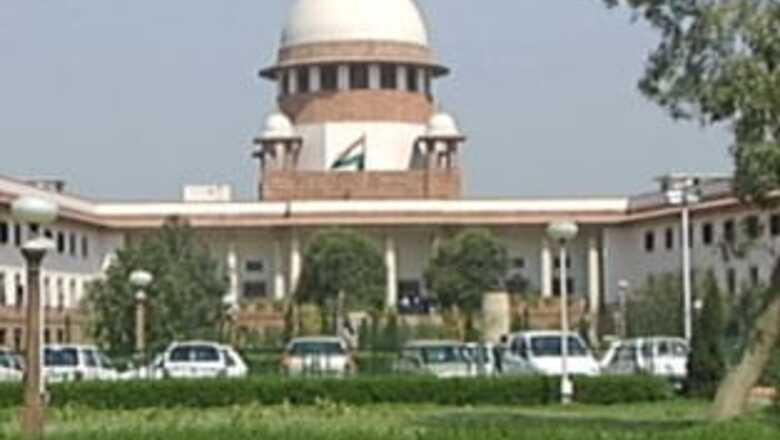
views
New Delhi: The Supreme Court is expected to deliver on Friday its much-awaited verdict on one of India's most high-profile legal battles between companies led by the two Ambani brothers, Mukesh and Anil, over natural gas supplies from the Krishna-Godavari basin.
A three-member bench of Chief Justice K.G. Balakrishnan, Justice B. Sudershan Reddy and Justice P. Sathasivam had reserved its judgement on Dec 18, after hearing the arguements that lasted 27 days, spread over nine weeks.
The chief justice is set to retire on May 11 and has been disposing of as many cases as possible before that.
At the core of the Krishna-Godavari gas dispute, is the validity of the agreement reached between the two brothers -- and blessed by their mother Kokilabehn -- at the time of the demerger of the erstwhile Reliance Group in June 2005, and concerns the price, quantity and tenure of gas supply by Reliance Industries Ltd to Reliance Natural Gas.
This agreement purportedly calls for 28 million units of gas to be supplied by Mukesh Ambani-led Reliance Industries to Anil Ambani-led Reliance Natural Resource at $2.34 per unit for a period of 17 years.
The fields, off the Andhra Pradesh coast, were won by Reliance Industries at the time when its founder, the legendary industrialist Dhirubhai Ambani, was still at the helm. These fields have since then turned out to be the biggest ever gas discovery made in India and one of the biggest in Asia in recent years.
Based on the a Based on the agreement greement, the sanctity of which was emphatically upheld by the Bombay High Court last June, the Anil Ambani group wants a part of the gas for its power plants.
The hearing in the high court was not without controversy, with the oil ministry, which had initially kept aloof from the case, arguing both in parliament and outside that the contractor had full marketing freedom in deciding whom to sell their share of gas, for what duration and at what price, belatedly seeking to intervene in the matter towards the fag end of the hearing.
Despite the ministry's invention, however, the Bombay High Court's division bench of Justice J.N. Patel and K.K. Tated upheld the gas agreement and directed Reliance Industries and Reliance Natural Resources to enter into a gas supply pact within a month.
Prior to that, two single judge benches of the Bombay High Court had also ruled in favour of Reliance Natural Resources in May and October 2007, respectively.
But Reliance Industries moved the apex court July 4, challenging the verdict on all three counts - the quantity, tenure and pricing of natural gas. Prior to that, Reliance Natural Resources had also filed a caveat with the court seeking binding orders.
As the case came up before the apex court, there was yet more drama in store.
The oil ministry first filed a petition asking for the agreement between the two brothers to be declared null and void.
Later, it faced the embarrassment of having to virtually withdraw the original petition. In the amended version that was filed later, it sought to argue that hydrocarbons discovered in India were sovereign assets that belonged to the government, and as such, the ministry alone had the power and freedom to decide whom the contractor could supply gas to, for how long and at what price.
The Prime Minister’s Office also had to ask the oil ministry to explain why it was being accused of siding with Reliance Industries on the dispute, even as opposition members raised the issue in parliament and demanded Petroleum Minister Murli Deora’s resignation.
In the spate of allegations that followed, the role of the oil regulator came under increasing scrutiny for allowing the capital expenditure on the gas fields to be hiked nearly four-fold from $2.4 billion to $8.8 billion, though the estimates of the original gas reserves was only doubled.
This eventually led to an inquiry by the Central Bureau of Investigation (CBI) into the conduct of the regulator and a special audit by India’s official auditor, the Comptroller and Auditor General (CAG).
Then on Nov 4 last year, after hearing the matter for two weeks, Justice R.V. Raveendran, one of the original members of the bench, withdrew from the case on the grounds that the firm for which his daughter was working, AZB Associates, had provided consultancy to Reliance Industries in the past.
Even earlier, just before the hearing was to commence Oct 20, Justice Raveendran had stated that he would like to recue himself from the case if anyone had objections since he held an equal number of shares in the two contesting companies.
Senior counsel Ram Jethmalani, appearing for Reliance Natural Resources, said that his client had no objection and that the learned judge was most suited to hear the matter. The counsel for Reliance Industries Harish Salve wanted the disclosure to be recorded.
















Comments
0 comment